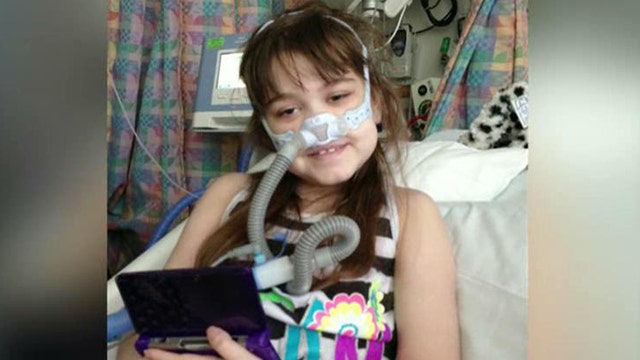The parents of a 10-year-old girl dying of cystic fibrosis are fighting organ-donation rules that require adult lungs be offered first to adults, who are in less serious need than their daughter.
Sarah Murnaghan, who has only weeks to live, is eligible for adult donor lungs, but because of her age, she can only receive them after all adult candidates – regardless of the seriousness of their condition -- have the chance to receive them.
"We're starting to face the fact that, you know, she may not make it. And that we're sitting here with weeks," her mother, Janet Murnaghan, of Philadelphia, told Fox affiliate WTXF.
"I want to be famous and be on stage and sing and dance, and play my xylophone," the young girl told the station.
Pediatric lungs are rare, and the Murnaghan family thought their daughter would have a shot at a transplant when she made a list of adults. But they soon found a national organ rule standing in their way, according to the station.
The Murnaghans said they learned Sarah, who is being treated at Children's Hospital of Philadelphia, has to be at least 12 to compete with adults on the list, even if there cases aren't as dire. Sarah is a top priority on the pediatric list, but officials say there are far fewer pediatric donors due to improved treatment.
Her parents say the severity of Sarah's illness would normally make her the highest priority for an adult lung, but all adults in the region with her blood type will be offered the lungs first, even those more stable and with less severe conditions. After an appeal was declined, the online petition was launched calling for that policy to change and for federal officials to make an "exceptional ruling" on behalf of the child.
"The only thing standing between my daughter living and my daughter dying is the fact that she's 10 and not 12," Janet Murnaghan said. "That's unreal to me."
"Since we really have gotten to understand the rules of all of this in the last week or two, it's really driven us to speak out," said Sarah's father, Fran Murnaghan.
Dr. Stuart Sweet, director of the pediatric lung transplant program at Washington University School of Medicine in St. Louis, who helped draw up the pediatric lung allocation guidelines, said a prioritization system wasn't set up for children younger than 12 because of a lack of data to set up proper statistical models, and an "apples-to-apples" comparison of relative illness between the two groups wasn't possible.
"Each time we direct a set of organs to a given patient, because there's a limited supply, that reduces the likelihood that another patient will get that organ and survive to transplant," he said.
While those advocating on behalf of younger donors fear that adult candidate may receive an organ despite being less sick, "there's no way to really answer that question," and the number of adults who die waiting for a transplant vastly outnumber the number of children who do, Sweet said.
"The reality is ... the numbers suggest that there's lots of patients who are running out of time on the waiting list and many more patients run out of time ... in the older age group than the younger group," he said.
Family and friends are fighting for her, circulating a petition on Change.org that as of Sunday had nearly 12,000 signatures.
Click here to view the Change.org petition
Click for more from MyFoxPhilly.com
The Associated Press contributed to this report.









































